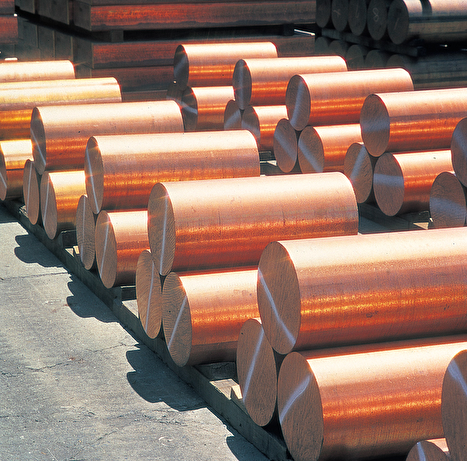The Ultimate Overview to Lasting Coping With Eco-Friendly Copper Products
The Ultimate Overview to Lasting Coping With Eco-Friendly Copper Products
Blog Article
Exploring the Diverse Applications of Copper Products in Modern Industries
From improving the effectiveness of electric systems to playing an essential duty in renewable power technologies, the adaptability of copper is evident. As industries significantly prioritize development and sustainability, the varied applications of copper warrant a closer examination, particularly regarding their prospective impact on future ecological practices and technical innovations.
Electric Applications of Copper
Copper is an essential product in the electrical industry, representing around 60% of the overall need for non-ferrous steels globally - Copper Products. Its superior electric conductivity, which is nearly twice that of aluminum, makes it the preferred selection for a large array of electric applications. From circuitry systems in household and industrial buildings to high-voltage power transmission lines, copper ensures efficiency and dependability in electrical power delivery
Along with wiring, copper is essential to the production of electrical elements such as generators, transformers, and motors. These elements leverage copper's thermal conductivity and pliability, crucial for warmth dissipation and reliable efficiency. Copper's resistance to corrosion improves the lifespan and toughness of electric systems, making it an economical solution in the lengthy term.
The development of renewable energy resources, such as solar and wind power, has additionally enhanced the need for copper in electric applications. As sectors transition towards lasting energy options, copper's duty comes to be also more vital. On the whole, the convenience and performance qualities of copper solidify its condition as a foundation material within the electrical sector, driving development and efficiency across various applications.
Plumbing and Piping Solutions
In contemporary plumbing systems, the option of materials significantly impacts both capability and long life. Copper has actually become a favored option because of its distinct residential properties, consisting of rust resistance and antimicrobial qualities. These attributes ensure that copper piping continues to be long lasting and safe for transferring potable water, a critical factor to consider in domestic and commercial applications.
Among the essential benefits of copper in pipes is its capability to withstand heats and pressures, making it ideal for a range of applications, from warm water systems to heating and cooling down networks. Furthermore, copper's flexibility allows for less complicated setup in intricate piping designs, reducing the danger of failings and leaks.
One more noteworthy advantage is copper's lengthy lifespan, usually surpassing half a century with proper maintenance. This long life not only lessens replacement expenses yet additionally adds to sustainable practices by reducing waste. Copper's recyclability lines up with contemporary ecological criteria, advertising a round economy within the pipes industry.
Copper in Renewable Energy
The flexibility of copper expands past plumbing applications, playing an essential role in the sustainable power market. In solar panels, copper is utilized in photovoltaic cells and wiring, helping with efficient energy conversion and transmission.

In addition, as the global need for electrical cars (EVs) rises, copper's function in battery systems and billing infrastructure ends up being much more considerable. The product's ability to carry out electrical power successfully is integral to the performance of EV batteries, boosting range and billing rate.
Copper's Role in Electronic devices
Electronic go to my site devices manufacturing relies heavily on copper's remarkable homes, especially its high electric conductivity and thermal performance. These characteristics make copper an optimal option for a vast variety of electronic parts, consisting of adapters, circuit boards, and wiring. The steel's capacity to effectively transfer electrical signals guarantees minimal power loss, which is important in high-performance electronic tools.
Furthermore, copper's thermal conductivity plays a considerable duty in heat dissipation, safeguarding delicate elements from overheating. This is specifically essential in modern-day electronic devices, where compact layouts result in boosted heat generation. Copper is additionally favored for its pliability and ductility, allowing it to be quickly formed into intricate styles that meet the demands of sophisticated digital applications.
With the increase of customer electronics, telecommunications, and electric automobiles, the demand for copper in the electronic devices sector remains to expand. As technologies in innovation advance, copper stays essential to attaining higher efficiency and reliability in digital products. Its recyclability additionally enhances its charm, as makers look for lasting services without endangering quality. Thus, copper remains a cornerstone material in the ever-expanding field of electronic devices.
Ingenious Makes Use Of in Production

One noteworthy application remains in additive production, where copper-based materials are utilized in 3D printing procedures. This permits the production of light-weight components and complicated geometries, specifically in the aerospace and automobile industries. Furthermore, copper's thermal conductivity makes it an ideal option for warmth exchangers, enhancing efficiency in commercial cooling systems.
Additionally, the rise of wise production has seen the unification of copper in IoT tools, where its conductive capabilities support advanced noticing modern technologies. In the world of renewable energy, copper is critical in the production of solar panels and wind turbines, promoting extra efficient energy conversion and distribution.
As industries strive for sustainability and innovation, copper's versatility and performance remain to place it as a vital product, driving developments in manufacturing and adding to the growth of smarter, extra reliable products.
Verdict
The essential function of copper in renewable energy and its important feature in electronics highlight its value in advancing sustainable techniques. Collectively, these applications highlight find out here now copper's critical contribution to technical progress and industrial performance in contemporary society.
From improving the efficiency of electric systems to playing an essential function in renewable energy technologies, the flexibility of copper is obvious. As industries progressively focus on innovation and sustainability, click this site the diverse applications of copper require a closer exam, particularly regarding their possible influence on future technical improvements and ecological practices.
The growth of eco-friendly power resources, such as solar and wind power, has further enhanced the need for copper in electric applications. Overall, the adaptability and performance qualities of copper solidify its condition as a keystone product within the electric sector, driving advancement and performance throughout numerous applications.
The convenience of copper prolongs beyond pipes applications, playing a vital role in the renewable energy sector.
Report this page